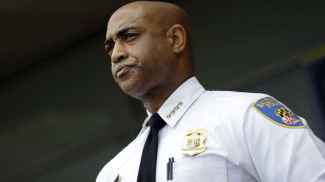by Aviva Shen
July 9, 2015
NOTICE: THIS WORK MAY BE PROTECTED BY COPYRIGHT
YOU ARE REQUIRED TO READ THE COPYRIGHT NOTICE AT THIS LINK BEFORE YOU READ THE FOLLOWING WORK, THAT IS AVAILABLE SOLELY FOR PRIVATE STUDY, SCHOLARSHIP OR RESEARCH PURSUANT TO 17 U.S.C. SECTION 107 AND 108. IN THE EVENT THAT THE LIBRARY DETERMINES THAT UNLAWFUL COPYING OF THIS WORK HAS OCCURRED, THE LIBRARY HAS THE RIGHT TO BLOCK THE I.P. ADDRESS AT WHICH THE UNLAWFUL COPYING APPEARED TO HAVE OCCURRED. THANK YOU FOR RESPECTING THE RIGHTS OF COPYRIGHT OWNERS.

Baltimore Police Commissioner Anthony Batts was fired on Wednesday being accused of causing “full-scale rioting” after the death of Freddie Gray. But will this have the Baltimore police turning on their more politically minded leaders?
Baltimore Police Commissioner Anthony Batts may be experiencing déjà vu after Baltimore Mayor Stephanie Rawlings-Blake announced she was firing him Wednesday. The announcement came on the heels of a police union report claiming their leadership had forced a “passive response” to protests over Freddie Gray’s death in police custody. The union squarely placed blame on Batts for leaving “officers in harm’s way, making them vulnerable and susceptible to attack” and causing “full-scale rioting.”
This isn’t Batts’ first time leaving a department under a cloud of ignominy. Batts came to Baltimore after unexpectedly resigning his leadership of the Oakland police force in California, where he oversaw the department during protests over the killing of Oscar Grant by a transit cop. He also resigned shortly before the police clashed with Occupy Oakland protesters.
The Oakland department was placed under federal scrutiny after officers were caught imposing vigilante justice and planting evidence on suspects. Batts was supposed to oversee this effort for 3 years, but left a year early after criticism that he wasn’t doing enough to turn things around.
“In 2009, I answered the call for a reform-minded chief; a leader with a focus on community policing and high professional standards,” Batts wrote in his resignation letter. “I found myself with limited control, but full accountability.”
The court-appointed monitor found under Batts’ leadership that OPD was still not taking misconduct seriously and threatened to enact stricter oversight. According to the monitor’s “scathing” report, “In almost all instances where compliance falls short, it is because responsibilities for supervision and review are not met.”
In Baltimore, Batts may have alienated his subordinates with his treatment of the Gray case. In unusually frank terms for an embattled police department, the commissioner announced early in the controversy that the officers had made mistakes, asserting Gray should have been given medical treatment immediately and that he may have been intentionally abused in the police van. Batts apologized to the union in May for underestimating the riots as they unfolded.
Since the protests over Gray’s death, Baltimore police have claimed that they do not feel comfortable doing their jobs and point to a recent spike in crime as evidence that a “softer, less aggressive police department” does not allow for effective policing. Other experts say abrupt fluctuations in crime tend to respond more to local circumstances like gang activity and other factors.
Police unions under scrutiny for brutal and abusive practices have historically turned on their more politically minded leaders. After Eric Garner’s death by police chokehold and the ensuing protests, New York police officers ceremonially turned their backs on Mayor Bill de Blasio (D) at a murdered officer’s funeral.
